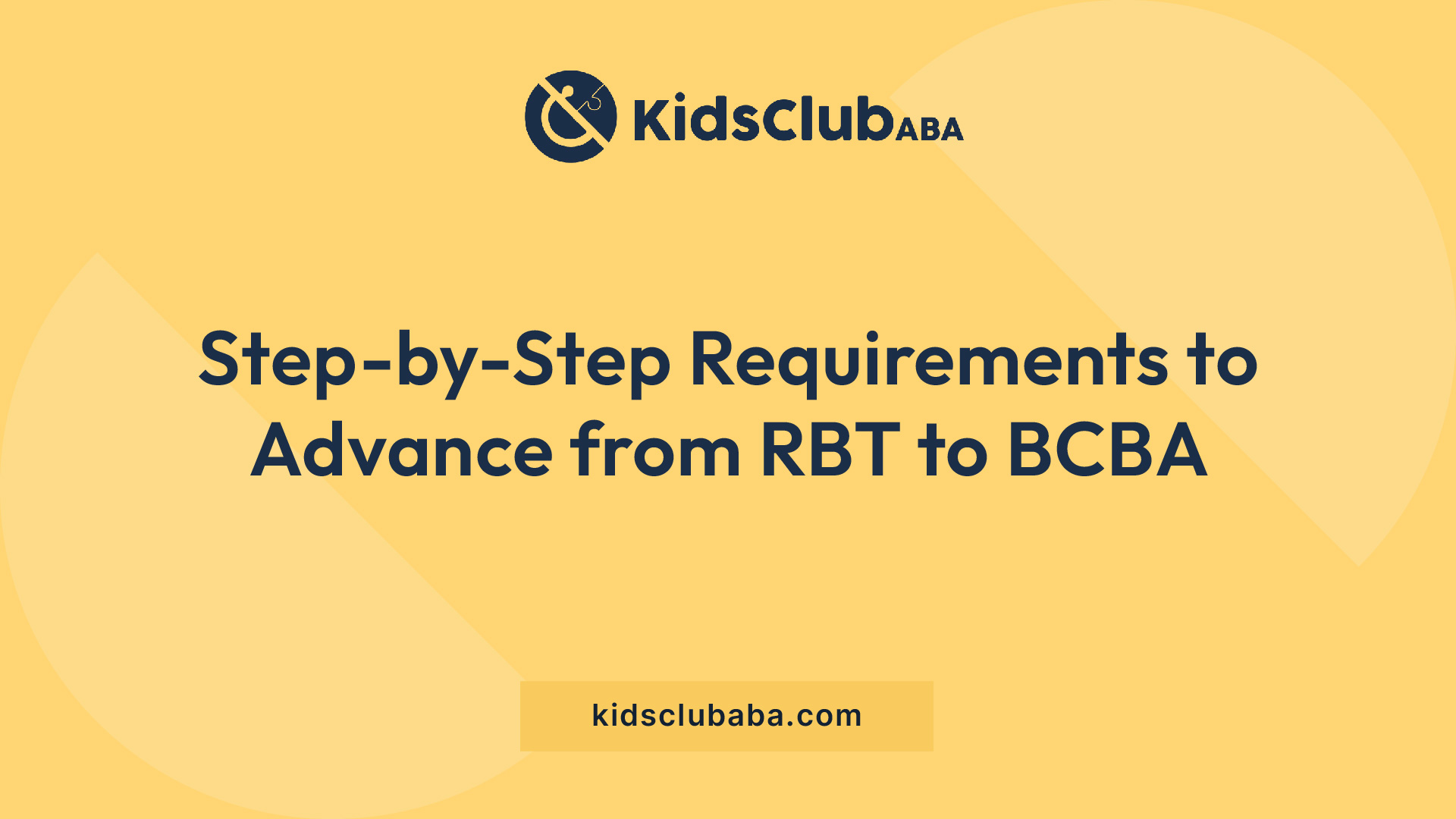Can an RBT Become a BCBA? Complete Career Pathway Guide
While working directly with clients, many Registered Behavior Technicians (RBTs) discover a passion for applied behavior analysis and subsequently wonder about advancing to become a Board Certified Behavior Analyst (BCBA). Fortunately, starting as an RBT provides an excellent foundation for the BCBA career path. In this comprehensive guide, we’ll examine the requirements, timeline, challenges, and strategies for successfully transitioning from an RBT to a BCBA.
Table of Contents
ToggleRBT to BCBA: Understanding the Career Progression

The journey from RBT to BCBA undoubtedly represents significant professional advancement within the field of applied behavior analysis:
Key Differences Between RBTs and BCBAs
- Scope of practice:
- RBTs implement behavior plans designed by others
- In contrast, BCBAs design assessment and intervention plans independently
- Education requirements:
- RBTs need a high school diploma and 40-hour training
- Meanwhile, BCBAs require a master’s degree in behavior analysis or related field
- Supervision relationship:
- RBTs receive supervision (minimum 5% of hours)
- Conversely, BCBAs provide supervision to RBTs and other staff
- Compensation differences:
- RBTs typically earn $35,000-$45,000 annually
- However, BCBAs average $75,000-$95,000 annually (108-129% higher)
According to the Behavior Analyst Certification Board (BACB), approximately 22% of current BCBAs began their careers as RBTs, thus demonstrating this is a well-established career pathway.
Step-by-Step Requirements to Advance from RBT to BCBA

1. Complete Educational Requirements
The first major step inevitably involves significant academic advancement:
- Minimum degree requirement: Master’s degree
- Acceptable fields of study:
- Behavior Analysis
- Education (with behavior analysis emphasis)
- Psychology
- Special Education
- Additionally, other related fields with appropriate coursework
- Coursework requirements:
- Verified Course Sequence (VCS) approved by the Association for Behavior Analysis International (ABAI)
- Moreover, a minimum of 315-385 classroom hours (depending on edition of coursework requirements)
- Furthermore, coverage of all BACB task list content areas
A survey by the Association of Professional Behavior Analysts found that 64% of RBTs pursuing BCBA certification choose online master’s programs while continuing to work, consequently taking an average of 2.5-3 years to complete their degrees.
2. Gain Supervised Fieldwork Experience
While completing academic requirements, aspiring BCBAs must simultaneously accumulate supervised experience:
- Current experience requirements (effective 2022):
- 2,000 hours of supervised fieldwork OR
- Alternatively, 1,500 hours of concentrated supervised fieldwork
- Supervision specifications:
- Must be supervised by a qualified BCBA
- In addition, a minimum of 5% of hours must be directly supervised
- Furthermore, monthly supervision is required
- Finally, experience must be completed within a 5-year period
Research indicates that RBTs have a significant advantage in this area, with 78% of RBTs who become BCBAs reporting they were able to complete their supervised fieldwork through their employer while maintaining paid positions.
3. Pass the BCBA Examination
After completing education and supervised experience, candidates must then pass the BCBA examination:
- Exam format:
- 185 multiple-choice questions
- 4-hour time limit
- Computer-based testing centers
- Content areas:
- Foundations of behavior analysis
- Concepts and principles
- Measurement, data display, and interpretation
- Assessment procedures
- Behavior-change procedures
- Subsequently, selecting and implementing interventions
- Lastly, personnel supervision and management
According to BACB data, the first-time pass rate for the BCBA exam is approximately 65%, with candidates who have RBT experience showing slightly higher success rates (around 68-70%) compared to those without direct implementation experience.
Typical Timeline: RBT to BCBA
The complete journey from RBT certification to BCBA credential typically takes 3-5 years:
Common Timeline Breakdown
- RBT work experience: Initially, 1-2 years (recommended before starting BCBA path)
- Master’s degree: Following that, 2-3 years (faster for full-time students)
- Supervised fieldwork: Concurrently, 1.5-3 years (can overlap with master’s program)
- Exam preparation: Subsequently, 2-4 months
- Application processing: Finally, 2-6 weeks
Industry statistics show that the average time from initial RBT certification to BCBA credential is 4.2 years, with those working full-time while studying part-time taking about 5 years, whereas those studying full-time can complete the process in as little as 3 years.
Strategies for Success: Optimizing the RBT to BCBA Pathway
1. Leverage Your RBT Experience Strategically
Starting as an RBT provides valuable advantages for the BCBA journey:
- Practical knowledge application:
- Understand implementation challenges firsthand
- As a result, develop clientele expertise before designing programs
- Additionally, build rapport-building skills essential for assessment
- Professional networking opportunities:
- Work directly with supervising BCBAs
- Therefore, connect with organizations that might sponsor education
- Moreover, build relationships for future supervised fieldwork
- Confirm career fit before significant investment:
- Experience the field before committing to graduate education
- Consequently, understand clientele preferences before specializing
- Furthermore, assess organizational cultures within the field
A BACB workforce survey found that BCBAs with prior RBT experience reported 22% higher job satisfaction and 15% lower burnout rates than those who entered the field directly at the BCBA level.
2. Select the Right Educational Program
Choosing an appropriate master’s program significantly impacts your journey:
- Program considerations:
- First and foremost, ABAI Verified Course Sequence (mandatory)
- Additionally, online vs. in-person options
- Furthermore, practicum/fieldwork integration
- Also, cost and financial aid availability
- Equally important, graduation and BCBA exam pass rates
- Popular program types for working RBTs:
- Online behavior analysis programs
- Alternatively, evening/weekend format programs
- Another option includes accelerated degree options
- In addition, employer-partnered educational programs
According to education data, 73% of RBTs transitioning to BCBAs choose programs that offer evening or weekend courses or fully online options to accommodate continued work as an RBT.
3. Maximize Supervised Fieldwork While Working
Accumulating supervised hours efficiently is undoubtedly critical:
- Employment strategies:
- To begin with, seek positions with on-site BCBA supervisors
- Whenever possible, negotiate supervision as part of employment
- Similarly, look for “RBT-to-BCBA pipeline” programs
- Alternatively, consider supervisory groups for independent supervision
- Tracking and documentation:
- Above all, use BACB-approved tracking systems
- Simultaneously, document all supervisory activities thoroughly
- In the meantime, maintain monthly verification
- Beyond that, diversify experience types (assessment, treatment, etc.)
Research shows that RBTs who secure supervision through their employer complete their fieldwork requirements an average of 8 months faster than those seeking independent supervision.
4. Financial Planning for the Transition
The financial aspect of this career advancement unquestionably requires careful planning:
- Education funding options:
- Primarily, employer tuition assistance (available at 41% of larger ABA providers)
- Secondarily, student loans (federal and private)
- Another option includes scholarships specific to behavior analysis
- Lastly, gradual payment through continued RBT work
- Return on investment analysis:
- On average, educational cost: $30,000-$50,000
- In comparison, average BCBA salary increase over RBT: $40,000+ annually
- As a result, typical ROI timeline: 1.5-3 years after BCBA certification
Financial surveys indicate that 64% of RBTs who become BCBAs recoup their educational investment within 2 years of certification through increased earnings.
Common Challenges and Solutions
Challenge 1: Balancing Work and Education
Working as an RBT while completing master’s-level coursework presents significant time management challenges:
- Effective solutions:
- First, negotiate reduced RBT hours during intensive academic periods
- Second, utilize academic breaks for increased work hours
- Third, select programs designed for working professionals
- Furthermore, develop strong time management systems
- If necessary, consider part-time academic progress
Surveys of successful RBT-to-BCBA professionals found that 68% reduced their working hours at some point during their education, with most finding a 25-30 hour work week optimal during coursework.
Challenge 2: Supervised Experience Quality and Quantity
Not all supervised experience is created equal:
- Quality improvement strategies:
- To improve outcomes, seek diverse clinical experiences
- Regularly request feedback
- Meanwhile, participate in multiple supervisory formats
- In addition, document cases across functions and populations
- For best results, engage in group supervision for varied perspectives
Research indicates that candidates with experience across at least three different population types (age groups, diagnoses, settings) have higher BCBA exam pass rates (72% vs. 65% overall).
Challenge 3: Exam Preparation While Working
Preparing for the rigorous BCBA exam while maintaining RBT responsibilities:
- Successful preparation approaches:
- To maximize success, begin studying 3-6 months before exam
- During this time, form study groups with peers
- Meanwhile, utilize practice exams and commercial prep programs
- If possible, request reduced hours for 1-2 months before exam
- Rather than memorizing, focus on application
A survey of first-time exam passers found they spent an average of 112 hours studying over 4.5 months, with most successful candidates studying 4-8 hours weekly.
Success Stories: RBT to BCBA Transition Examples
Case Study 1: Traditional Pathway
- Starting point: Initially worked as an RBT at center-based provider
- Education: Subsequently pursued online master’s while working 30 hours/week
- Supervision: Throughout this period, accumulated hours through employer
- Timeline: Overall, 4.5 years from RBT to BCBA
- Key strategy: Notably, used employer tuition assistance program
- Outcome: As a result, achieved 85% salary increase upon BCBA certification
Case Study 2: Accelerated Approach
- Starting point: Started as an RBT with bachelor’s in psychology
- Education: Afterward, enrolled in full-time accelerated master’s program
- Supervision: Simultaneously completed concentrated supervised fieldwork (1,500 hours)
- Timeline: Consequently finished in just 2.5 years from RBT to BCBA
- Key strategy: Financed through student loans and savings from RBT work
- Outcome: Eventually specialized in early intervention, resulting in 110% salary increase
Case Study 3: Balanced Progression
- Starting point: Began as a career-changer who started as an RBT
- Education: Subsequently completed part-time online program over 3 years
- Supervision: Meanwhile, combined employment and independent supervision
- Timeline: In total, 4 years from RBT to BCBA
- Key strategy: Importantly, maintained full-time work throughout
- Outcome: Finally opened independent practice 2 years after certification
Is the RBT to BCBA Path Right for You?
Consider these factors when deciding whether to pursue this advancement:
- Professional motivation assessment:
- First, do you enjoy the analytical aspects of ABA?
- Next, are you interested in program design and supervision?
- Additionally, do you prefer varied responsibilities over direct implementation?
- Furthermore, are you comfortable with the documentation and compliance aspects?
- Resource evaluation:
- Most importantly, can you dedicate 2-5 years to this professional journey?
- Also, do you have the financial resources for graduate education?
- Moreover, can you manage reduced income or increased time commitments?
- Lastly, do you have support systems in place for this undertaking?
- Alternative pathways to consider:
- Alternatively, RBT → BCaBA (bachelor’s level certification) → BCBA
- Another option includes RBT → specialized senior RBT roles
- Or consider RBT → related fields (special education, speech therapy)
Job satisfaction surveys found that 92% of BCBAs who previously worked as RBTs reported that the advancement was worth the investment, compared to 84% satisfaction among all BCBAs overall.
Conclusion: A Viable and Rewarding Career Pathway
The progression from RBT to BCBA represents a significant yet achievable career advancement that offers substantial professional growth, increased autonomy, and financial rewards. Although the journey requires considerable investment in education, supervised experience, and examination preparation, starting as an RBT provides valuable practical experience that enhances both the learning process and eventual effectiveness as a behavior analyst.
For those committed to the field of applied behavior analysis, the RBT credential serves not just as an entry-level position but rather as the first step in a long-term career pathway. With careful planning, strategic use of resources, and persistence, RBTs can therefore successfully navigate the requirements to become Board Certified Behavior Analysts and ultimately expand their impact in the lives of the individuals they serve.

